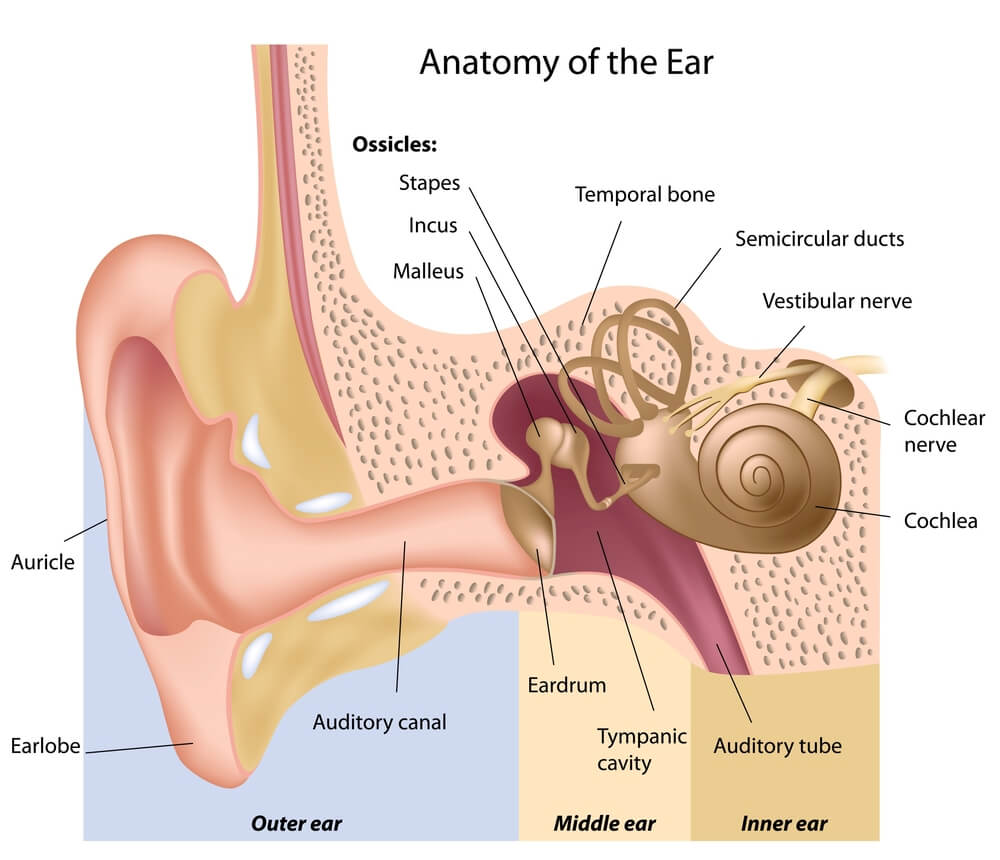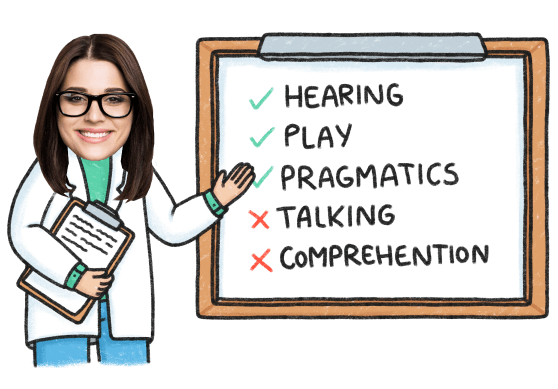Speech and Language: An Audiologist’s Perspective
Feb 7, 2022 Speech therapists and audiologists are two separate healthcare professionals with their own unique training and skillset.
Even though speech therapists and audiologists certainly fulfill different roles, they often work closely together to track your child’s progress and make adjustments to their therapy where necessary.
Typically, it’s speech therapists who focus on speech and language, and audiologists who focus on hearing. But, what both these professionals have in common is that they specialize in communication.
Speech, language, and hearing all go hand-in-hand, which is why speech therapists generally suggest a hearing assessment before starting with speech therapy.
Boost Your Child’s Speech Development!
Improve language & communication skills with fun learning!

What is an Audiologist?
Audiologists are healthcare professionals that conduct hearing tests and help children and adults manage their hearing loss. These professionals are trained to complete hearing evaluations in a variety of environments, as well as fit hearing devices for people of all ages.
A pediatric audiologist reduces the impact of your child’s hearing loss on their speech and language development.
In fact, your child’s hearing loss can affect a number of their skills and can even make it difficult for them to remember things. If this happens, then your child has to do more “mental work” when processing the information they are trying to hear in comparison to their peers who can hear.
Why is Hearing Important for Speech and Language?
I’m sure this is relatively self-explanatory, but in order for speech and language to develop, you first need to be able to hear the speech and language around you. This video sums it up pretty well:
What this means is that hearing loss can have a definite adverse effect on your child’s speech and language development, and the extent of this adversity is dependent on the different types and degrees of hearing loss that your child may have.
Types of Hearing Loss
The human ear has three parts (the outer ear, middle ear, and inner ear), and the type of hearing loss your child experiences will depend on which part of the ear is affected:

- Conductive hearing loss: Usually caused by something blocking the sound from moving through your child’s ear, which makes it difficult for them to hear.
This is the most common type of hearing loss experienced by children, and is due to their tendency to experience recurrent ear infections.
- Sensorineural hearing loss: Usually caused by damage to the hearing organ (called the ‘cochlea’) or the auditory nerve, which carries sound from your child’s ear to their brain for understanding.
Unfortunately, this type of hearing loss usually can’t be “fixed” and requires assistive therapy, such as the use of hearing aids.
- Mixed hearing loss: This occurs when your child experiences conductive hearing loss and sensorineural hearing loss at the same time.
Degrees of Hearing Loss
When an audiologist talks about the degree of hearing loss, they are referring to how severe the hearing loss is, and how much hearing difficulty your child has.
Mild hearing loss:
- Difficulty understanding people speaking softly
- Difficulty understanding people when there is lots of background noise
- Can miss up to 50% of classroom discussions
- Difficulty hearing and saying consonants
Moderate hearing loss:
- Language problems including limited vocabulary and delayed development of grammar and sentence construction
- Can struggle with speech production
- Voice quality may be toneless
Moderate to severe hearing loss:
- Conversation must be very loud to be heard
- Distinct problems with verbal communication, especially in the school environment
- Delayed speech and language development
- Speech production is mostly unintelligible
- Toneless voice quality
Severe hearing loss:
- Can identify only certain sounds close to them
- Can distinguish vowel sounds but not consonants
- Speech and language does not develop spontaneously
- Extremely delayed speech and language
Profound hearing loss:
- Reacts more to vibrations that to sound
- Speech and language does not develop spontaneously
Basically, the greater the degree of hearing loss, the more likely your child is to experience speech and language delays.
Additionally, hearing loss can affect your child’s social and emotional development, and even be a barrier to learning when they start their schooling

How do Speech Therapists and Audiologists Work Together?
Speech therapists and audiologists continuously communicate when they work together to help your child. If a speech therapist feels your child might have a hearing loss, then they will refer you to an audiologist. Likewise, if your audiologist feels your child might have a speech and language delay, then they will refer you to a speech therapist.
The audiologist’s primary role is to help children and their families communicate by:
- Conducting a hearing test to assess if hearing loss is present. If there is a hearing loss, an audiologist will be able to discern how severe it is and what part of the ear may be causing it.
- Helping children and their families understand the different coping methods and ways that can be used to help a child with hearing loss communicate.
- Working with children and families to choose the best hearing device to support communication.
- Programming the hearing device to ensure that children gain the ability to hear new words and sound as far as possible.
The speech therapist’s primary role is to help children and their families communicate by:
- Helping children and their families understand how the hearing loss will impact the child’s ability to learn to communicate.
- Teaching children and parents methods to help with listening and talking.
- Conduct speech therapy and aural rehabilitation sessions to teach children and their families how to communicate while taking the type and degree of hearing loss into account.
- Help children and their families teach others about hearing loss and how it can affect communication
Ultimately, audiologists have a big impact on the children they treat. We all need language to “think,” and this thinking is a lot easier to do when you can develop your spoken language by hearing the speech of those around you.
It is up to speech therapists and audiologists to work together to ensure that children who have hearing loss reach their full potential.

Here’s How Speech Blubs Can Help
Speech Blubs uses fun speech therapist-approved activities to activate your child’s speech and language and even has a free screening tool that can help pick up if your child may have a hearing loss.
The app makes use of video modeling, face filters, and speech recognition to help your child learn, and is especially helpful to children with hearing loss. This is because children with hearing loss tend to be visual learners, so being able to watch child “experts” in order to imitate the sounds and words they make is a key to unlocking their learning potential.
It’s not enough for children with hearing loss to watch people when they speak simply; they also require quiet, self-directed environments that promote their learning using fun and educational activities, the independence which Speech Blubs can provide!
We are positive that Speech Blubs will help your child speak better, sooner, and more confidently.

